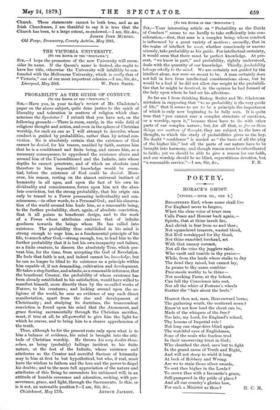[TO THE EDITOR OF THE "SPECTATOR. " ] SIB,—Your interesting article on
" Probability as the Guide of Conduct " seems to me hardly to take sufficiently into con- sideration,—first, that man is a complex being, whose conduct is influenced by a great variety of motives ; secondly, that in the realm of intellect he must, whether consciously or uncon- sciously, take probability as his guide. For intellectual certainty, it would seem that there must be perfect knowledge. At pre- sent, "we know in part," and probability, rightly understood, deals with the quantity of our knowledge. Thirdly, .probability belongs wholly to the mind. We are certainly not guided by the intellect alone, nor were we meant to be. A man certainly does not fall in love from intellectual considerations alone, but he would be a fool if he did not allow due weight to the probabili- ties that he might be deceived, in the opinion he had formed of the lady upon whom he had set his affections.
So far am I from thinking Bishop Butler and Mr. Gladstone mistaken in supposing that " to us probability is the very guide of life," that it seems to me to be a principle the importance of which is only now beginning to be fully seen. It is quite true that " you cannot rear a complex structure of emotions, or a worship, upon it," because these have to do with other parts of our complex nature; but, for all that, so far as these things are matters of thought, they are subject to the laws of thought, to which the study of probabilities gives us the key. No doubt " confidence" is needed as "the basis of all the play of the higher life," but all the parts of our nature have to be brought into harmony, and though reason must be subordinated to faith; yet we should be able to give a reason for our faith, and our worship should be no blind, superstitious devotion, but
"a reasonable service."—I am, Sir, &c., F. B.


































 Previous page
Previous page